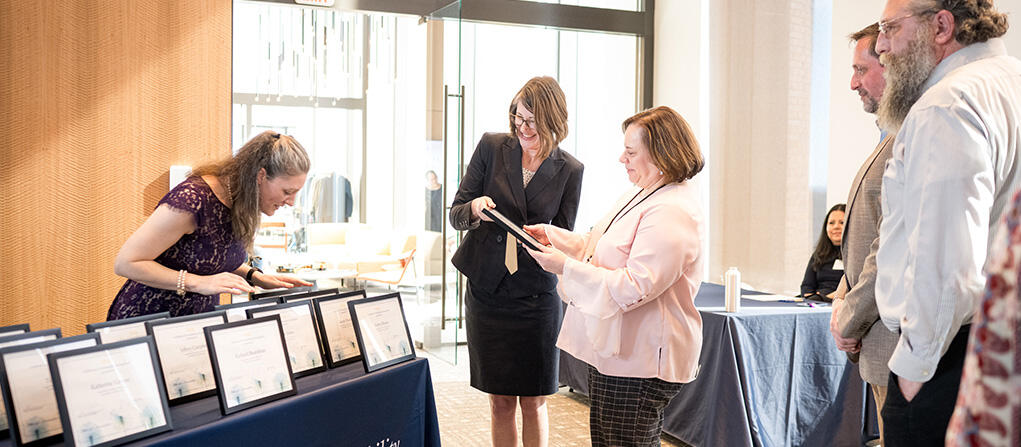
In celebration of Earth Day, the Yale Office of Sustainability honored 19 individuals with awards for making significant contributions to advancing sustainability at the university.
The recipients of the 2024 Sustainability Awards include a staff member whose work was instrumental in launching the Yale Center for Natural Carbon Capture, students whose efforts revitalized shareware and bikeshare programs at Berkeley College and led to better waste management at the Slifka Center for Jewish Life, and a group of Yale collections professionals developing energy-saving solutions in museums and cultural properties.
Awardees were honored at the annual State of Sustainability event on April 9, held in the newly renovated top floor of Kline Tower, a LEED Gold-certified project. The gathering drew more than 100 faculty, staff, student, and alumni attendees from all parts of campus.
Amber Garrard, Director of the Office of Sustainability, welcomed the crowd and provided a detailed overview of Yale’s sustainability ambitions and progress. President Salovey shared remarks about the achievements Yale has made on its climate and sustainability goals, and Julie Zimmerman, Vice Provost for Planetary Solutions, spoke about Yale’s crucial role in developing answers for the most pressing questions posed by climate change.
This year’s awardees were evaluated on the basis of the impact their efforts had, the level of innovation and replicability in their work, the degree of collaboration involved, and their commitment to equity and justice.
“Sustainability at Yale is not possible without the incredible efforts of many individuals across the university community,” said Garrard. “The individuals we are recognizing have found ways to advance sustainability through their personal behaviors, by influencing or building communication with peers and colleagues, and by leveraging their unique skillsets to contribute to larger efforts. We are extremely grateful for their dedication and we congratulate them all.”
Staff Award
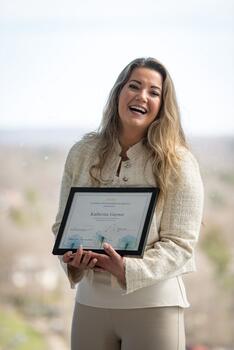 Katherine Gaynor, senior administrative assistant with the Yale Center for Natural Carbon Capture (YCNCC), has been an integral part of the center’s growth and success over the past three years. In her role, Gaynor spearheaded the first faculty search, assisted in administrative tasks to set up the center’s workshop and postdoctoral programs, and organized various events, including the annual spring symposium which gathers experts from around the world for panel discussions on natural solutions to mitigate climate change. One of Gaynor’s contributions in implementing sustainability practices at YCNCC is to ensure that events are eco-friendly by recycling name tags, utilizing QR codes for electronic documents, providing zero-waste meals, and offering virtual options for attendees.
Katherine Gaynor, senior administrative assistant with the Yale Center for Natural Carbon Capture (YCNCC), has been an integral part of the center’s growth and success over the past three years. In her role, Gaynor spearheaded the first faculty search, assisted in administrative tasks to set up the center’s workshop and postdoctoral programs, and organized various events, including the annual spring symposium which gathers experts from around the world for panel discussions on natural solutions to mitigate climate change. One of Gaynor’s contributions in implementing sustainability practices at YCNCC is to ensure that events are eco-friendly by recycling name tags, utilizing QR codes for electronic documents, providing zero-waste meals, and offering virtual options for attendees.
Group Award
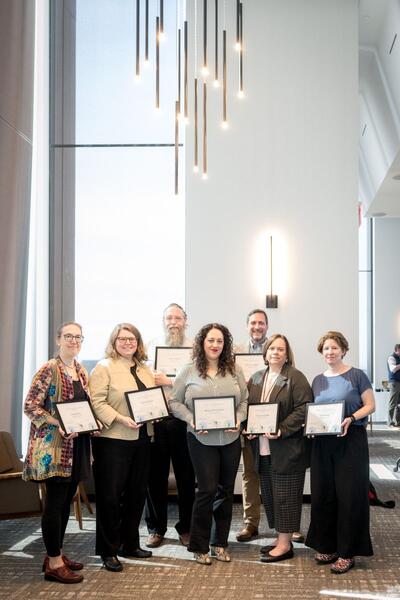 The Environmental Monitoring Project, spearheaded by the Yale Institute for the Preservation of Cultural Heritage and the Cultural Heritage IT Committee, worked collaboratively across departments and areas of specialization to seek opportunities to drive solutions to climate change by recognizing and seeking to address the unique impact Yale’s collections spaces have on the environment. A two-day workshop last fall brought together experts and contributors from across Yale’s collections community— including the various libraries, galleries, museums, and collection facilities—with the aim of aggregating environmental monitoring data across the university and improving collection storage and display conditions while optimizing energy use. Group members, pictured from left: Sarah Prown, project manager for the Cultural Heritage IT Collaboration; Alison Gilchrest, director of the Institute for the Preservation of Cultural Heritage; Jason DeBlock, director of collections at Yale University Art Gallery; Mariana Di Giacomo, natural history conservator at the Peabody Museum; Jeffrey Campbell, associate director of digital asset technologies; Christine McCarthy, director of preservation and conservation at Yale Library; Susan Butts, director of collections and research at the Peabody Museum.
The Environmental Monitoring Project, spearheaded by the Yale Institute for the Preservation of Cultural Heritage and the Cultural Heritage IT Committee, worked collaboratively across departments and areas of specialization to seek opportunities to drive solutions to climate change by recognizing and seeking to address the unique impact Yale’s collections spaces have on the environment. A two-day workshop last fall brought together experts and contributors from across Yale’s collections community— including the various libraries, galleries, museums, and collection facilities—with the aim of aggregating environmental monitoring data across the university and improving collection storage and display conditions while optimizing energy use. Group members, pictured from left: Sarah Prown, project manager for the Cultural Heritage IT Collaboration; Alison Gilchrest, director of the Institute for the Preservation of Cultural Heritage; Jason DeBlock, director of collections at Yale University Art Gallery; Mariana Di Giacomo, natural history conservator at the Peabody Museum; Jeffrey Campbell, associate director of digital asset technologies; Christine McCarthy, director of preservation and conservation at Yale Library; Susan Butts, director of collections and research at the Peabody Museum.
Group members not in photo: Mark Aronson, deputy director and chief conservator at the Yale Center for British Art; Richard Boardman, assistant director of facilities at the Peabody Museum; Lynn Jones, museum assistant at the Peabody Museum; Tara Kennedy, head of preventive conservation at Yale Library; Seong-June Kim, software engineer and tech lead for Information Technology Services; Julie McEvoy, consultant for Information Technology Services; Corey Myers, chief registrar at Yale Center for British Art; Robert Sanderson, senior director for digital cultural heritage at Yale Library; Cynthia Schwarz, senior associate conservator of paintings at Yale University Art Gallery.
Student Awards
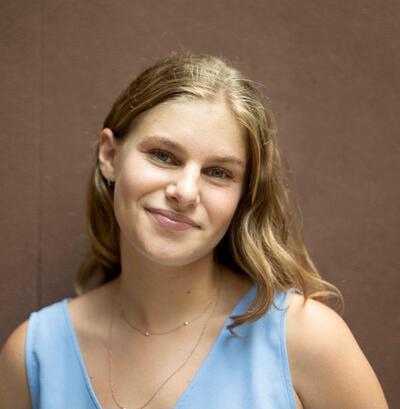 Molly Weiner ’25, currently a junior in Berkeley College, is committed to sustainability across a wide range of efforts, from student advocacy to her academic pursuits. She has engaged in legal and policy research at the Yale Center for Environmental Law and Policy, acted as a student organizer with the Endowment Justice Coalition at Yale, and has served as a member of the national Campus Climate Network and Yale Sustainable Consulting Coalition. Weiner spent three years working with the communications team at Yale Farm, helping to expand attendance in weekly workdays and speaker events. Her work with the Slifka Center for Jewish Life as a sustainability intern has led to improvements in waste management and labeling in the Slifka dining hall. Her academic studies have fostered new research regarding legal protections for farm workers against wildfire smoke, improving air quality safety and enforcement on a practical and theoretical level.
Molly Weiner ’25, currently a junior in Berkeley College, is committed to sustainability across a wide range of efforts, from student advocacy to her academic pursuits. She has engaged in legal and policy research at the Yale Center for Environmental Law and Policy, acted as a student organizer with the Endowment Justice Coalition at Yale, and has served as a member of the national Campus Climate Network and Yale Sustainable Consulting Coalition. Weiner spent three years working with the communications team at Yale Farm, helping to expand attendance in weekly workdays and speaker events. Her work with the Slifka Center for Jewish Life as a sustainability intern has led to improvements in waste management and labeling in the Slifka dining hall. Her academic studies have fostered new research regarding legal protections for farm workers against wildfire smoke, improving air quality safety and enforcement on a practical and theoretical level.
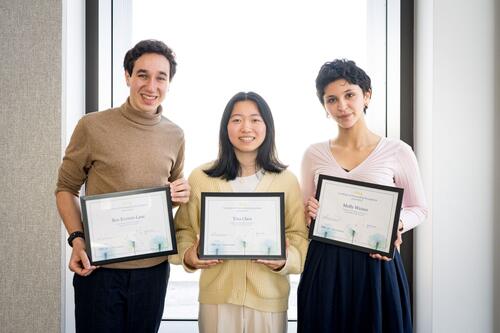 Tina Chen ’24 and Ben Everett-Lane ’24, both seniors, have led sustainability efforts within Berkeley College. Based on feedback from student employees, the Office of Sustainability’s Peer Educator program transitioned to a community impact model this year. Formerly it was a model that employed individual college student liaisons tackling challenges directly in their colleges. As a result of this shift, Chen and Everett-Lane sought opportunities within Berkeley specifically to drive sustainability progress. Together, they revived and reinvigorated the college’s shareware reusable dish loan program for student events, as well as a college bikeshare program and thrift shop. These efforts required collaboration with facilities and dining staff, as well as college staff.
Tina Chen ’24 and Ben Everett-Lane ’24, both seniors, have led sustainability efforts within Berkeley College. Based on feedback from student employees, the Office of Sustainability’s Peer Educator program transitioned to a community impact model this year. Formerly it was a model that employed individual college student liaisons tackling challenges directly in their colleges. As a result of this shift, Chen and Everett-Lane sought opportunities within Berkeley specifically to drive sustainability progress. Together, they revived and reinvigorated the college’s shareware reusable dish loan program for student events, as well as a college bikeshare program and thrift shop. These efforts required collaboration with facilities and dining staff, as well as college staff.
The success of Yale’s sustainability efforts is built upon the contributions of individuals and groups across the University, and we congratulate and thank all our 2024 honorees for their leadership!